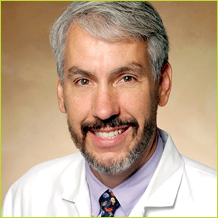Thomas A. Bledsoe, M.D., FACP
Primary Care Internist, University Medicine
Clinical Associate Professor of Medicine, Warren Alpert School of Medicine, BrownUniversity
Planning for end-of-life medical care is something many people don't think about until it's too late. But being prepared for what may lie ahead is the best way to ensure that your wishes are followed. Dr. Bledsoe, who is the Chair of the Rhode Island Hospital Ethics Committee, specializes in medical ethics. We spoke with him about how patients and decision makers should work together on this important issue.
Q: What is the first step to preparing for end-of-life care?
A: I think of it as a process rather than an event. The first step is just to think about it and discuss it with a loved one. There are two questions you should ask yourself. First, if you were suddenly in a position where you were unable to make your own medical decisions, who would you want to make them for you? This person is called a "proxy" and could be a spouse, relative, friend, or someone else. By law, their authority would be limited to representing your wishes. They aren't able to advocate for medical care that is contrary to your known wishes.
The second question is: Does the person you choose to make decisions for you know they "have the job," and do they understand what your end-of-life wishes are? It's very important to document the answers to these questions.
Q: How does someone document their end-of-life wishes to ensure they are followed?
A: Documentation can be as simple as written notes about a conversation between you and your doctor. But the best method is to use your state's legal form for an advance care directive. In Rhode Island, that is the Durable Power of Attorney for Health Care form. You can find this form online. [See "Learn more" at right.] It documents who will become your proxy and allows you to document other wishes by choosing to answer more specific questions, such as whether or not to use feeding tubes or life support. The advance directive provides helpful information to physicians, such as who to talk to and what steps to take when determining a patient's end-of-life care.
Q: Who should think about having advance care directives in place?
A: Everyone, but we prioritize based on the likelihood that it will be needed sooner rather than later. Working backward from most important to not quite as important, people who should have advance directives in place include those who have recently been in a hospital with a serious chronic illness; those who have a chronic illness and may not be able to make their own decisions at some point (the elderly, a person with a brain tumor); those over age 50 who have chronic medical problems; and then everyone over age 50.
It comes down to being prepared. The conception of what is an "acceptable" or "unacceptable" quality of life is an individual one, and assuming others know what would be acceptable for you is risky and could be very burdensome for the decision maker. Many famous or high-profile examples of ethical and legal end-of-life controversies have involved younger, healthy people who didn't have a plan in place.
Q: What can you do if a loved one won't discuss their end-of-life wishes with you?
A: Well, you can't make someone talk about it if they simply don't want to. My best advice is to try to ask questions that at least get the person thinking about it. You could say something like "I may be in a position someday to have to make decisions for you, and knowing and documenting your wishes will help me honor what you would have wanted." This may make them realize that the burden would fall on you or another loved one, creating a very difficult situation that could have been avoided with advance planning.
Q: What role does/should a doctor play in end-of-life care planning?
A: Honestly, medical books and training only get you so far. As a physician and especially as a primary care internist who cares for the whole patient, part of my professional responsibility is to have my patients' goals and values in mind when I make medical decisions. I must assess their wishes so I can recommend testing and treatment strategies and plan for their medical care.
It's also my role to facilitate a conversation about end-of-life care between patients and their potential surrogate decision makers, and to assist them as needed with documenting their wishes. Many patients who really should have thought about end-of-life care haven't done so; some have thought about it but haven't talked about it yet; still others have already decided who their proxy would be but just haven't told anyone yet.
Q: As a doctor, how do you balance the clinical and human sides of end-of-life care?
A: The human body is an incredibly complicated machine. There are "manuals" about how to work the machine; this kind of information is available in medical textbooks. But the "owner" of the body is a person who has dreams, goals, values, wants, needs, relationships, etc. Decisions, especially those at the end of life, should involve much more than just clinical experience. It's professionally rewarding for me to get to know patients as individuals and find out what's most important to them. Then I have a basis to help determine the most appropriate treatment strategies for that patient.





